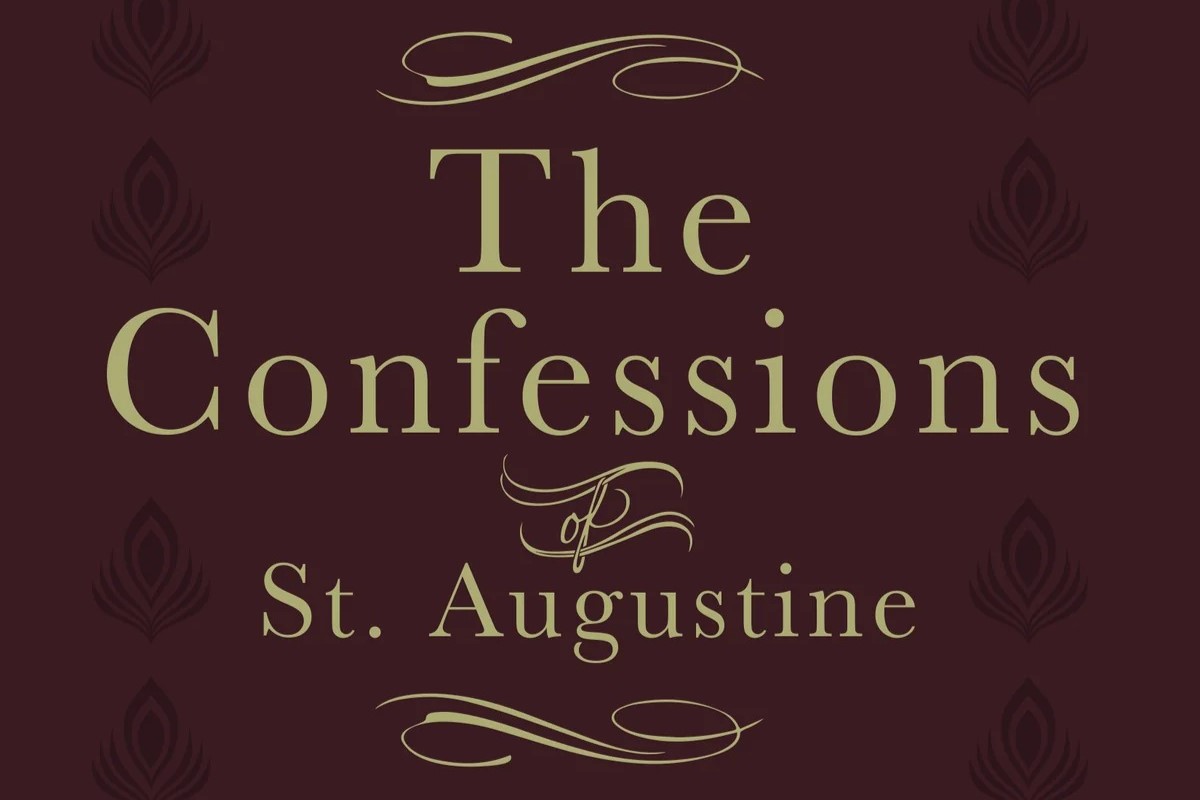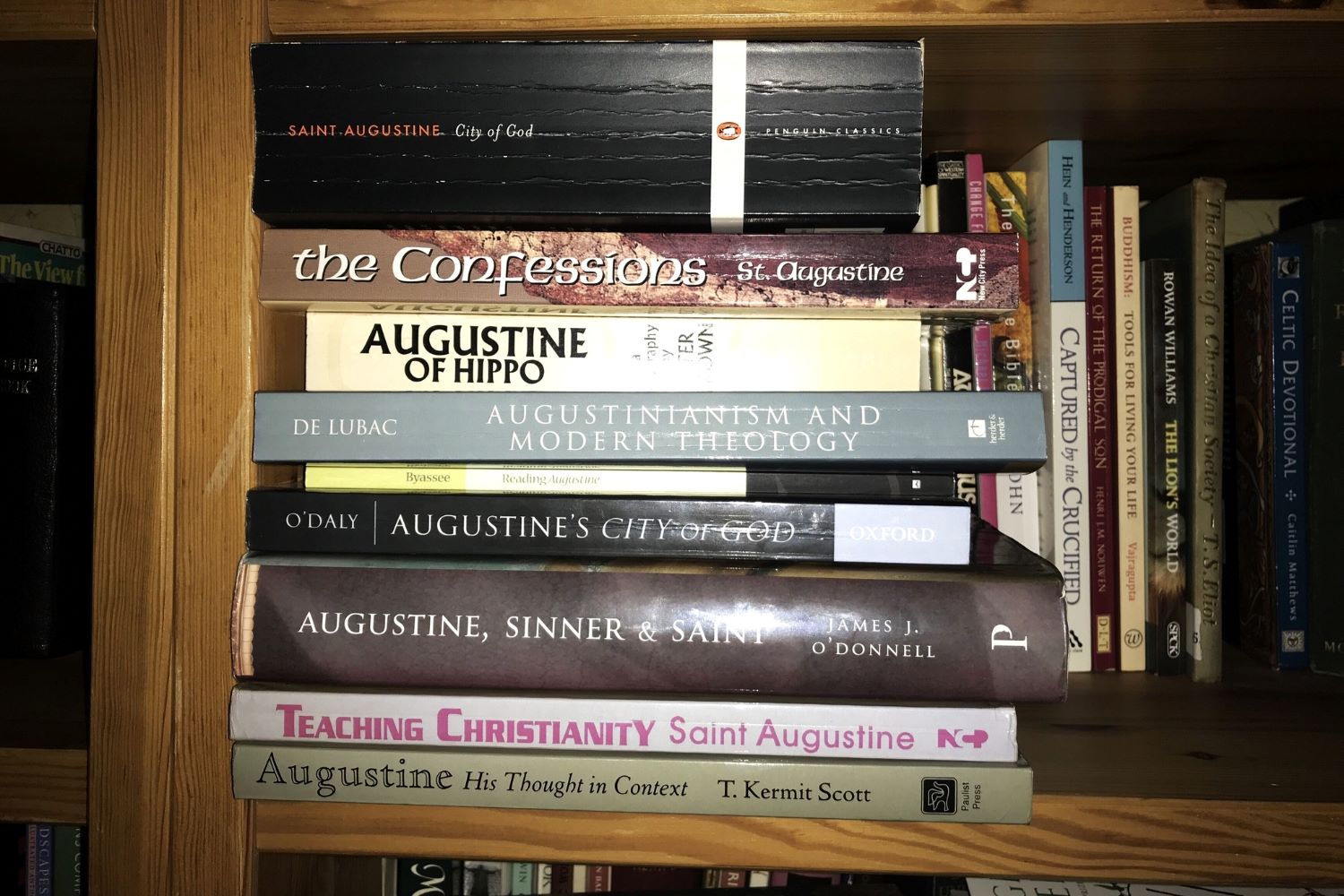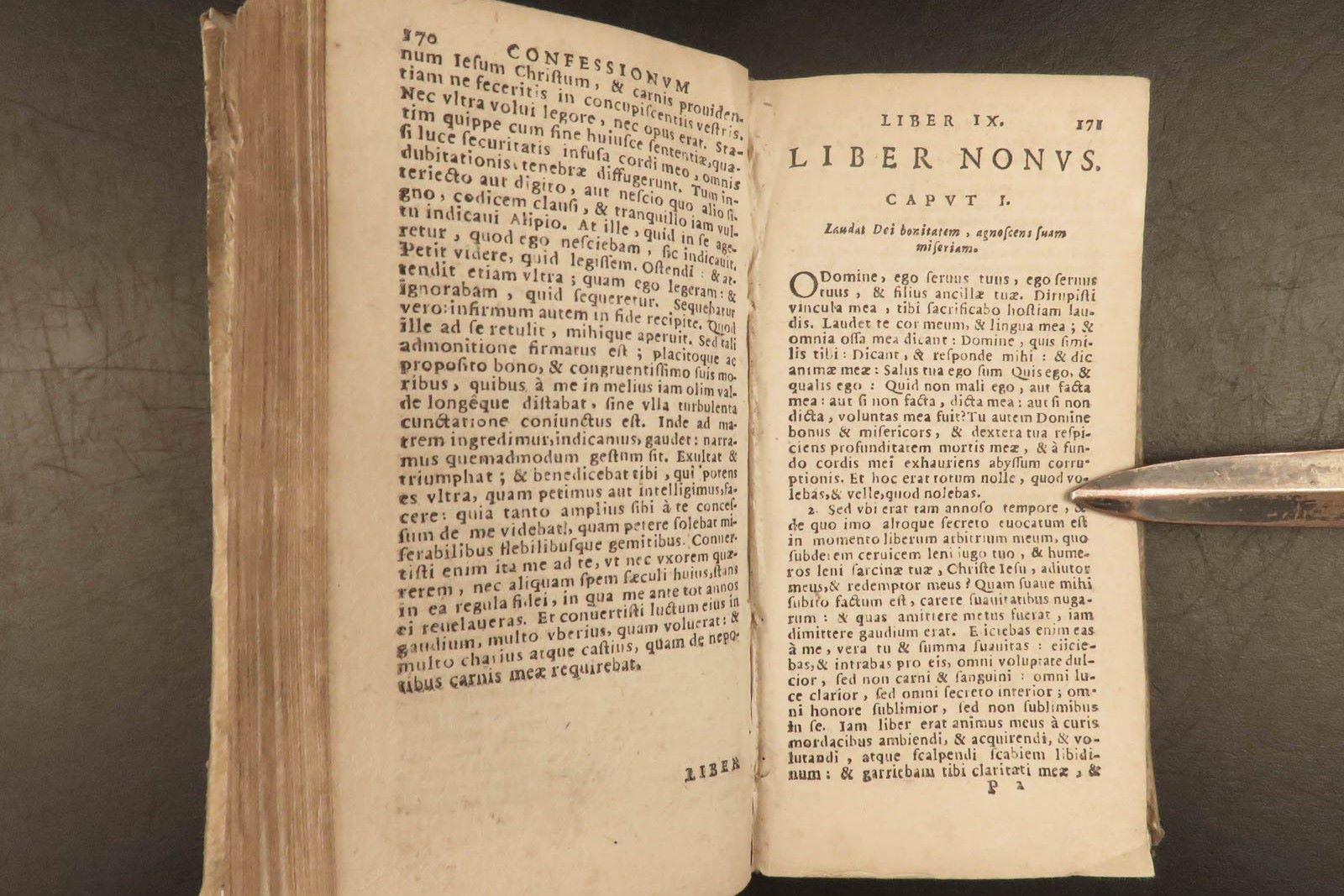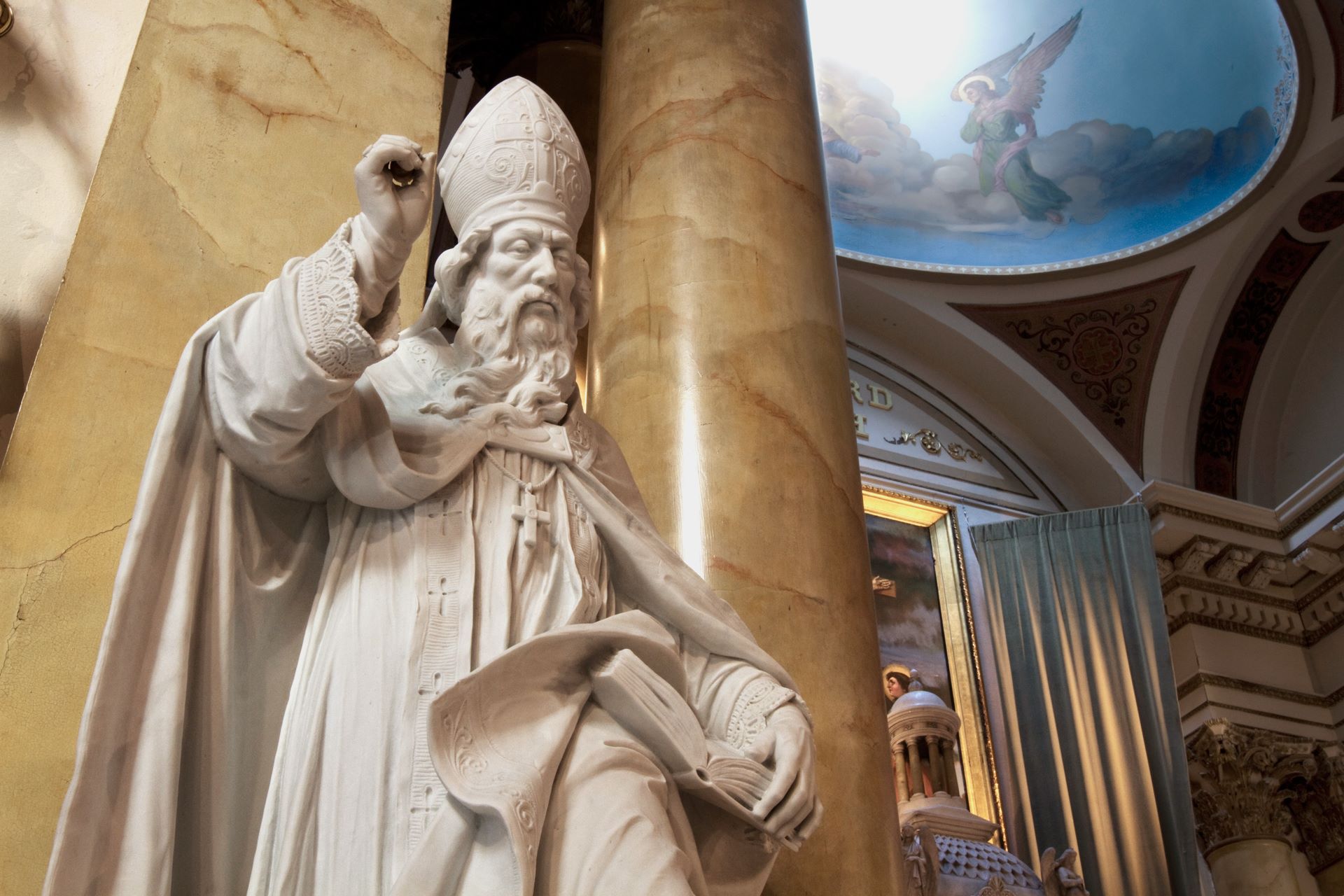Home>Theology and Spirituality>Who Did Augustine Write Confessions For


Theology and Spirituality
Who Did Augustine Write Confessions For
Published: February 10, 2024
Jason DeRose, Managing Editor at Christian.net, uses his expertise in religion and journalism to deepen understanding of faith's societal impacts. His editorial leadership, coupled with a strong academic background, enriches the platform’s diverse content, earning him recognition in both journalism and religious circles.
Augustine wrote Confessions for those seeking a deeper understanding of theology and spirituality, offering profound insights into the human experience and the pursuit of truth. Discover the timeless wisdom of this influential work.
(Many of the links in this article redirect to a specific reviewed product. Your purchase of these products through affiliate links helps to generate commission for Christian.net, at no extra cost. Learn more)
Table of Contents
Introduction
Augustine of Hippo, a towering figure in the history of Christianity, penned one of the most influential works of Western literature: "Confessions." This timeless masterpiece is not merely a recounting of personal experiences; it delves into the depths of human nature, spirituality, and the pursuit of truth. As we embark on an exploration of this profound work, it's essential to understand the context in which Augustine wrote "Confessions" and the audience for whom it was intended.
The journey through "Confessions" is akin to a pilgrimage, with Augustine as the guide, leading readers through the labyrinth of his thoughts, struggles, and revelations. It is a deeply introspective work that invites readers to contemplate their own existence and relationship with the divine. The themes of sin, redemption, and the relentless pursuit of God's grace resonate across centuries, making "Confessions" a timeless beacon of spiritual introspection.
As we delve into the layers of Augustine's narrative, we will unravel the complexities of his audience, the purpose behind his confessional writing, and the enduring impact of "Confessions" on theology, philosophy, and literature. Join me in this exploration of Augustine's magnum opus, as we seek to comprehend the profound significance of "Confessions" and its enduring relevance in the modern world.
Read more: When Did Augustine Write
Augustine's Audience
When Augustine penned his seminal work, "Confessions," he had a specific audience in mind. The composition was not intended for a casual reader but rather for a select group of individuals deeply entrenched in the theological and philosophical discourses of the time. Augustine's audience comprised both the educated elite and the burgeoning Christian community, each with distinct yet intersecting interests in the themes he expounded upon.
The educated elite of Augustine's era, particularly in the Roman Empire, were well-versed in classical philosophy and literature. They were the intellectual aristocracy, seeking profound insights and philosophical truths. Augustine, a former rhetorician and philosopher himself, strategically crafted "Confessions" to resonate with this erudite audience. By infusing his narrative with philosophical musings, existential quandaries, and theological reflections, Augustine aimed to captivate the minds of the intellectual elite, inviting them to ponder the nature of truth, the human condition, and the pursuit of spiritual fulfillment.
Simultaneously, Augustine addressed the burgeoning Christian community, which was navigating its place within the broader societal and intellectual landscape. His autobiographical account of spiritual transformation and redemption served as a guiding light for fellow believers, offering solace, inspiration, and a profound understanding of the complexities of faith. Through "Confessions," Augustine sought to fortify the faith of his Christian audience, providing them with a deeply personal testimony of his own spiritual journey and the unwavering grace of God.
Moreover, Augustine's audience extended beyond the confines of his contemporary society. Across the expanse of time, "Confessions" has continued to captivate readers from diverse cultural, intellectual, and religious backgrounds. Its universal themes of human longing, divine grace, and the quest for ultimate truth have transcended temporal and spatial boundaries, resonating with audiences across epochs and civilizations.
In essence, Augustine's audience for "Confessions" encompassed the erudite intellectuals of his time, the burgeoning Christian community, and a timeless readership that spans centuries. His ability to engage these diverse audiences speaks to the enduring relevance and universal appeal of "Confessions" as a profound exploration of the human experience and the relentless pursuit of spiritual truth.
Purpose of Confessions
The purpose of Augustine's magnum opus, "Confessions," transcends mere autobiographical documentation. At its core, "Confessions" serves as a profound exploration of the human soul's relentless quest for spiritual fulfillment and divine grace. Augustine embarked on this literary endeavor with a multifaceted purpose, each layer contributing to the richness and enduring significance of his confessional work.
First and foremost, "Confessions" stands as a testament to Augustine's unwavering commitment to introspection and self-examination. Through the meticulous recounting of his life's journey, from his youthful indiscretions to his eventual conversion to Christianity, Augustine sought to lay bare the intricacies of the human condition. His introspective narrative serves as a mirror for readers, compelling them to confront their own moral failings, existential yearnings, and the timeless struggle between earthly desires and spiritual enlightenment.
Furthermore, "Confessions" embodies Augustine's fervent desire to articulate the transformative power of divine grace. By meticulously chronicling his spiritual odyssey, replete with moments of doubt, intellectual turmoil, and eventual surrender to the omnipotent grace of God, Augustine endeavors to illuminate the profound impact of faith on the human psyche. His confessional narrative becomes a vessel through which readers can vicariously experience the tumultuous yet redemptive journey from spiritual desolation to profound communion with the divine.
Moreover, "Confessions" serves as a didactic tool, offering profound theological insights and philosophical musings to its audience. Augustine deftly weaves complex theological doctrines and philosophical inquiries into the fabric of his narrative, enriching the reader's intellectual and spiritual landscape. Through his confessional prose, Augustine imparts timeless wisdom, inviting readers to grapple with profound questions of existence, morality, and the nature of divinity.
Ultimately, the purpose of "Confessions" extends beyond the confines of Augustine's era, transcending temporal and cultural boundaries to resonate with readers across centuries. It stands as a timeless testament to the human longing for transcendence, the transformative power of faith, and the enduring relevance of spiritual introspection. In essence, "Confessions" serves as a beacon of enlightenment, guiding generations of seekers on their quest for spiritual truth and existential meaning.
The Impact of Confessions
The profound impact of Augustine's seminal work, "Confessions," reverberates across centuries, transcending temporal and cultural boundaries to shape the theological, philosophical, and literary landscapes of the Western world. Augustine's confessional narrative has left an indelible imprint on the collective consciousness of humanity, wielding its influence in multifaceted dimensions.
At the heart of its impact lies the enduring resonance of Augustine's introspective journey. "Confessions" serves as a timeless mirror, reflecting the complexities of the human soul and the perennial struggle for spiritual fulfillment. Its candid portrayal of Augustine's inner turmoil, moral dilemmas, and eventual surrender to divine grace resonates with readers on a deeply personal level, inviting introspection and self-examination. The work's universal themes of sin, redemption, and the relentless pursuit of God's grace continue to captivate and inspire individuals across diverse cultural and religious spectra.
Furthermore, "Confessions" stands as a cornerstone of Christian theology, shaping the contours of theological discourse and doctrinal contemplation. Augustine's profound theological insights, seamlessly interwoven into his confessional narrative, have permeated the intellectual fabric of Christianity, influencing theological thought and doctrinal formulations. His exploration of concepts such as the nature of sin, the omnipotence of divine grace, and the intricacies of human will has engendered profound theological contemplation, enriching the theological tapestry of Christianity.
Beyond theology, "Confessions" has left an indelible mark on the literary landscape, transcending its theological underpinnings to emerge as a timeless work of literary artistry. Its introspective prose, philosophical depth, and existential inquiries have inspired generations of writers, poets, and thinkers, shaping the trajectory of Western literature. The work's profound influence on literary genres such as autobiography, spiritual memoirs, and philosophical treatises underscores its enduring legacy as a literary masterpiece.
Moreover, the impact of "Confessions" extends to the realm of philosophical inquiry, where Augustine's profound reflections on the nature of truth, the human condition, and the pursuit of spiritual enlightenment have engendered philosophical contemplation and discourse. His nuanced exploration of the interplay between faith and reason, the complexities of human desires, and the transcendent nature of divine grace continues to stimulate philosophical inquiry, resonating with philosophers and thinkers across epochs.
In essence, the impact of "Confessions" transcends the confines of a singular era, permeating the collective consciousness of humanity with its timeless wisdom, profound introspection, and enduring relevance. Augustine's confessional masterpiece stands as a testament to the enduring power of spiritual introspection, theological contemplation, and literary artistry, leaving an indelible imprint on the human quest for existential meaning and spiritual enlightenment.
Conclusion
In conclusion, Augustine's magnum opus, "Confessions," stands as a timeless testament to the enduring power of spiritual introspection, theological contemplation, and literary artistry. Through the intricate tapestry of his confessional narrative, Augustine invites readers on a profound journey of self-discovery, spiritual transformation, and the relentless pursuit of divine grace. The impact of "Confessions" reverberates across centuries, transcending temporal and cultural boundaries to shape the theological, philosophical, and literary landscapes of the Western world.
At its core, "Confessions" serves as a mirror for the human soul, reflecting the perennial struggle for spiritual fulfillment, the complexities of the human condition, and the transformative power of faith. Augustine's introspective prose resonates with readers on a deeply personal level, inviting introspection, self-examination, and a profound contemplation of one's own spiritual journey. The work's universal themes of sin, redemption, and the relentless pursuit of God's grace continue to captivate and inspire individuals across diverse cultural and religious spectra.
Furthermore, "Confessions" has left an indelible mark on the theological landscape, shaping the contours of theological discourse and doctrinal contemplation. Augustine's profound theological insights, seamlessly interwoven into his confessional narrative, have permeated the intellectual fabric of Christianity, influencing theological thought and doctrinal formulations. His exploration of concepts such as the nature of sin, the omnipotence of divine grace, and the intricacies of human will has engendered profound theological contemplation, enriching the theological tapestry of Christianity.
Beyond theology, "Confessions" has emerged as a timeless work of literary artistry, inspiring generations of writers, poets, and thinkers. Its introspective prose, philosophical depth, and existential inquiries have shaped the trajectory of Western literature, leaving an indelible mark on literary genres such as autobiography, spiritual memoirs, and philosophical treatises. The work's profound influence on the literary landscape underscores its enduring legacy as a literary masterpiece.
In essence, Augustine's confessional masterpiece stands as a testament to the enduring power of spiritual introspection, theological contemplation, and literary artistry, leaving an indelible imprint on the human quest for existential meaning and spiritual enlightenment. As readers continue to embark on the timeless pilgrimage through "Confessions," they are beckoned to confront their own existential yearnings, moral dilemmas, and the unwavering pursuit of divine grace, perpetuating the enduring legacy of Augustine's profound narrative for generations to come.















